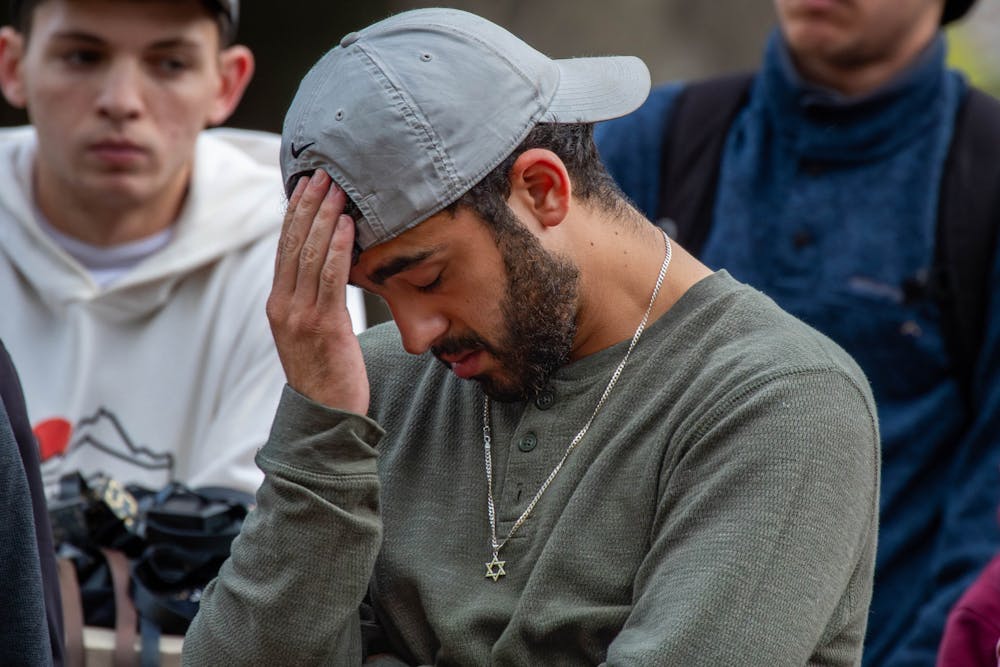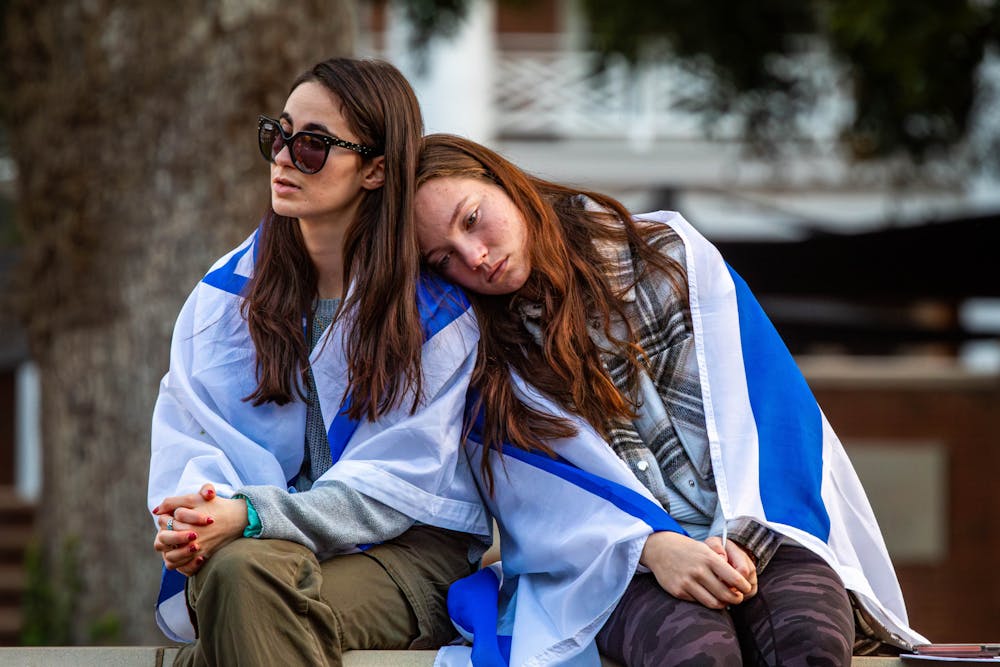When senior Samantha Katz was 12 years old, she traveled to Israel for her bat mitzvah project — where she fundraised for an Israeli girl her age who had survived a bombing on a bus. Katz has kept in contact with her for nine years now and said her thoughts immediately went to her and her family, who are now living in Jerusalem.
“I reached out to them right away. Thankfully, they're doing OK. They are staying in their own bomb shelter that they have to have,” Katz said. “Being in a terrorist attack already, and now having a war going on right now all around your home. They're traumatized.”
At the Israel Solidarity Gathering on Phi Beta Commons on Oct. 9, students and faculty came together to support those affected by the Israel-Hamas war.
On Oct. 7, the Hamas militant group attacked the southern border of Israel — killing and abducting local residents. The Israeli government declared a war on Hamas on Oct. 8, which has led to bombings and mass casualties of nearly 1,600 as of 4 p.m. Oct. 9, according to the Associated Press.
The gathering, hosted by Elon Hillel and Chabad, included praying, singing Oseh Shalom — a Jewish prayer for peace —, offering resources to students and providing options of where to donate.
President of Elon Hillel senior Mandi Lichtenstein said Hillel and Chabad wanted to work together to show support to the Jewish community on campus.
“Today we aim to focus on praying for our brothers and sisters in Israel,” Lichtenstein said. “A lot of Elon students have either traveled to Israel, have families in Israel, friends in Israel, all kinds of connections to Israel, and we just wanted to give people the opportunity to come together as a full Elon Jewish community.”
Junior Joshua Franklin, president of Elon Chabad, said the gathering was necessary to support the Jewish community at Elon University.
“We are oftentimes hesitant about speaking out because of fear of repercussions and persecution, but today we said, ‘This is enough,’” Franklin said. “The emotional support and love that being in community brings was so important, and we wanted to make sure that every Elon student — especially those who are Jewish — felt supported and loved, and that all of them know that there is someone they can reach out to when they feel alone, because they will feel alone and scared from these things.”

Elon University senior Ethan Rafal collects himself during a rally on Elon's Phi Beta Kappa Commons on Oct. 9 to support those affected by the Israel-Hamas war.
Katz, both a member of Hillel and Chabad, said this was the largest turnout of a Jewish event she has seen during her time at Elon. The gathering brought over 50 members of the Elon community.
“This has been one of the biggest gathering of Jews that I have seen here in a very long time,” Katz said. “Being able to lean on this community and seeing the support that was here today just gives me a lot of hope seeing Jews and non-Jews be here.”
Franklin said he feels as though he has become desensitized to the conflicts in Israel, even though he has friends and family helping in the war.
“I've shut down. Most of my friends are in the frontlines in the army in Israel. … A lot of my family is also on their way to volunteer at hospitals and volunteer at different places in Israel,” Franklin said. “I'm desensitized. As horrible as it's to say that, I'm used to the violence against Jews, it's the life we have to lead; it's the burden we have to bear, and I hope this is the last time that we do but I don't know if it is.”
Sophomore Zach Weitzen spent nine months in Israel before coming to Elon through a gap year program and said he also has friends in the Israel Defense Forces who he is worried about.
“I know a lot of people who live there. I actually have family there for now at the age to serve, more who are over the age and are being re drafted are drafting back into the IDF to serve,” Weitzen said. “To think that I have family there right now who's on the frontlines, basically, and also just people who I know are in shelters and stuff, it's really disheartening because it's scary that I might text them right now, and I might not get a response for a day or two.”
Elon Hillel Jewish Educator Boaz Avraham-Katz said his nephew is currently serving in the IDF and is concerned for his well-being.
“I speak to my sister every day. I wake up in the morning, I say, ‘Do we have any updates? What's going on and so far?’” Avraham-Katz said. “Everything's good. He's OK, I don’t know where he is and I don’t know what he does.”
Katz said she is thinking about everyone who is being affected by the attacks.
“My thoughts are with them and anyone who is fighting for this war, all of the civilians — Jewish or not, because this is not only a Jewish thing, this is a humanity thing,” Katz said. “It's just beautiful to see all of us coming together to support Israel and promoting that peace and unity.”
The university also provided a Sacred Space in the Numen Lumen Pavilion to gather and reflect on the war. The space is open 8 a.m. to noon and 1 p.m. to 5 p.m. Tuesday and 8 a.m. to 5 p.m. Wednesday and Thursday.
University chaplain the Rev. Kirstin Boswell said the Sacred Space is meant to bring the community together by providing an area to listen.
“There will be people with a lot of complex emotions around this issue,” Boswell said. “I think that we need to create room for people to have those emotions to express them to help them do so in ways that are constructive.”
Anjolina Fanaroni, Jenna Manderioli, Ryan Kupperman and Mason Willett contributed to the reporting of this story.


